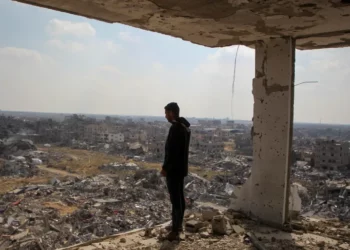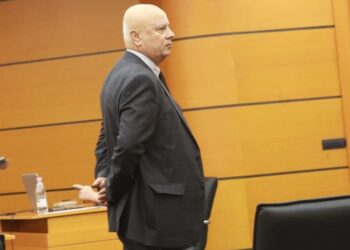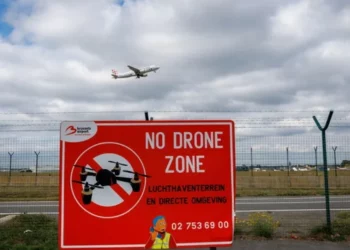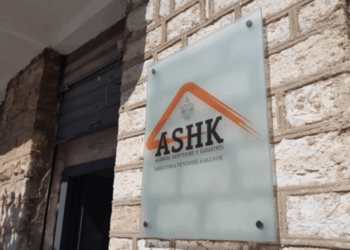The business of private security services is expected to double in the next three years, according to market operators, driven by increased demand that has fueled the escalation of organized crime and terrorism. In 2014, the field companies circulated 40 million euros, up 40 percent compared to 2012. Despite rapid development, the market is suffering from short-term contracts and low prices offered for services.
The escalation of organized crime and the new dimensions in which international terrorism activity is exercising has positively impacted the security services business. The September 11, 2001 terrorist acts in the United States have fostered a rapid development in international security services. In Albania, the development of this market is driven by the need of foreign investors (banks, telecommunications companies, oil companies, HEC etc.) to maintain their facilities. In parallel with the development of the economy at higher demand for goods and services, there is a growing demand for security services as well. From the year 2011 to 2014, the main market companies have increased annual turnover by 40-150%. Albert Ndreu, administrator of Ndreu Secyrity, claims that in the next three years, the market will double. And the number of employees will go to over 20 thousand.
But Durim Nazeri, administrator of Nazeri 2000, argues that with all the prospect of growth, market operators are suffering short-term contractions and low prices offered. Frequent change of physical security operators limits investment development and staff training, he added.
The licensed companies at the end of 2014 reached an annual turnover of about 40 million euros, according to data from the balances submitted to the National Registration Center, with a growth of almost 40% compared to 2012. Of this amount, 10 € million was raised by public institutions that needed private security services, while some 9,000 employees were hired. But the number of companies was lower in 2014 (about 240 out of over 300 in 2012) due to the restrictions imposed by the new law to not allow subcontractor services.
Despite the rapid growth, the sector is suffering from lack of oversight and oversupply of the market with operators, but sector businesses are optimistic as service seekers are widening massively across business lines like bars, restaurants, etc.
Foreign investments such as TAP, new hydropower plants in the Devoll River, etc., and other HPPs across the country are a good offer for more security services.
Security provided by private operators, despite being partial, affects both the overall security of the country and even national security, says Roland Tashi, chair of the Security Committee at the Albanian Association of Banks. According to him, the state must strengthen the private security sector, control it, set it in line, through laws, decisions and instructions, so that it can walk and develop according to European standards.
Increase in three-digit rates
The main providers of physical security services have seen rapid growth in turnover over the past three years, driven by some legal adjustments that were made in 2014. The new Law on Private Personal Physical Security (FSPS) established a floor payment for security employees, minimum wage + 50%. This cost on wages was set at prices and, consequently, the company’s earnings increased.
Pelican Security, the largest operator in the field, saw an annual increase of 156% compared to 2012. The company’s revenues reached ALL 869 million in 2014, from ALL 338 million that were declared in the balances submitted to NRC.
Nazeri 2000, one of the largest market operators, with no increase in turnover in 2014 by 42% compared to 2011, Ndreu Security for the same period increased turnover by 170% and Brecani Security increased its sales revenue by 3%.
But the company’s revenues are not stable year-on-year, as they are contingent upon contracts, especially with public institutions, which account for one-fourth of revenue for companies. Rogat Security, Spartan Security and Eurogjici saw an annual decline in revenue in 2014 compared to 2011, respectively by 46%, 7% and 11%
Nazeri says that high competition has made this service available at very low prices, under cost and short term contracts, and therefore the quality of delivery of this service depends on this factor.
Private security companies have maintained satisfactory profits over the last few years. The profit rate varies from 3 to 20% according to special operators. Stability in income and profits has been heavily influenced by termination of contracts with public institutions by shortening funds in the middle of the year.
Employment, growing rapidly
According to data from the Geneva Center for the Democratic Control of Armed Forces (DCAF) until May 2015, there were 240 physical security companies providing facilities and physical protection services to persons (Category i.3.A) and 24 companies provided escort and transport of monetary values and precious items (Category i.3.B). In the period from August 2014 to May 2015, 44 SPSPs provided services of category 3.A, while 5 SPPSFs offering category services.3.B were removed from the market.
Although the security requirement comes from the private sector, the state remains the single largest customer, primarily purchasing services for the preservation of facilities of public institutions, including infrastructure of particular importance. The amount of public funds for such services between 2012 and 2014 has increased from 9 to 11 million euros. This amount is equal to about 9% of the annual budget of the Ministry of Interior. According to DCAF data, over one third of companies had access to public funds intended for the purchase of security services (public funds accounted for over 40% of the annual revenues of these SHPSFs during 2012-2014.
Specifically, over the past ten years, the number of private security sector employees has more than doubled (from about 4,093 people in 2005, this number at the end of 2015 is 8911. Albert Ndreu from Ndreu Security says very soon, employees in the private security market will exceed the number of State Police employees with a doubling in the mid-term perspective.
Business under political influence
The Geneva Center for Democratic Control of the Armed Forces says that in Albania, the business of Security services is linked to political influences.
Although lawmakers have tried to bypass the politics of the private security sector through various interventions, such as the adoption in 1995 of a 1993 law provision prohibiting the formation of associations by private security companies, the private security sector is under the influence of politicians and civil servants.
The 2001 law attempted to address the issue of politicization, forcing societies to appoint a technical director, who is responsible for administering SPSFS. The reasoning was that even if SPSF owners could have political ties, the delegation of SPSF’s daily work into the hands of the technical director would make it possible to avoid the influence of the owner’s political beliefs on SPSF activities.
However, the DFCA report says that law enforcement by technical directors has not solved the problem of politicization, as owners still make major decisions within companies, particularly about the latter’s activity. In addition, in general, societies cultivate their political ties in order to increase the prospect of obtaining contracts with the state.
“Over the years, societies have found that linkage with ruling parties may also be a negative side, especially when the party they support, goes away from power and goes into opposition, and they lose direct ties with decision-makers. Given that refusal to renew the license is often used as a means of pressure and to remove companies from the market. Consequently, the current law of the Private Security Services (2014) does not set limits for the duration of a license, “the DFCA report states.
Nazeri: Quality of service is limited by short-term contracts and low prices
Nazeri 2000 Administrator said that the private market of providing physical security services is on the rise, as companies have invested in tools and technology for several years, aiming to increase standard and quality, but Nazeri says the market is under pressure from short-term contracts and low prices offered by service seekers.
How is the business climate for the security market currently?
Currently, in the security market, a number of licensed companies operate to provide private security services and of course this has led to a high level of competition between SHPSF companies.
SHPSF companies provide their service to: Budget Institutions, Banking System, Other Private Objects (factories, warehouses, shops, etc.).
Regarding the security service for budget institutions, the procedure for selecting the winner is all electronically and is transparent, in these procedures all those companies that offer below the legal cost limits are disqualified and therefore, almost all SHPSF companies bid on the same value and the winning company is selected by lot.
Another procedure is followed in the banking system, where the technical capacity and the lowest price are considered for the selection of the SHPSF company that will provide the service.
Regarding other private facilities for providing security services, the company is contracted, which has the most favorable price and the appropriate capacities.
Providing security service to the banking system is the dominant service and takes on the most quality service offered by the SHPSF companies, which occupy an important place. As part of the improvement of this service it is worth mentioning that in this system, considering also the other countries of the region and beyond, the contracting of SHPSF companies is made with long-term contracts with specialized companies, creating the conditions for increasing the standard and investments long-term and non-short-term, as operated in the Albanian market. We mention this fact, as short-term contracts and service delivery for a bank by many SHPSF companies do not leave investment opportunities, as even the incomes generated in this form are much lower and create the inability of companies to invest in this market .
Other key factors that have affected the SHPSF functioning climate are: the Ministry of Interior, operators operating in the market for this type of service, service seekers.
In the framework of the strengthening and well-functioning of the security service by SHPSF societies, the Ministry of Interior has issued a series of legal and subordinate legal acts that have directly increased the quality of service quality. Some of the legal changes that have positively impacted the provision of this service are the age limitation, the salary increase of the service employee by 50% on minimum wage, secondary education, creation of shooting ranges, training of service employees at the Academy of Order etc., there is also work to improve the normative acts in continuity. So all these legal changes have influenced the growth of the standard and have given the security service the right breathing to move towards improving its quality conditions. It is worth mentioning here also the fact that the structures of the Ministry of Interior, during the developments for the legal changes, have continued meetings with the stakeholders, representatives from different societies of the SPSF where the suggestions and opinions were taken into consideration given. As far as the protection of the interests of service delivery from SHPSF is concerned, there are 3 associations, which are of the opinion that they need to be more active to take initiatives, whose voice is heard by the respective structures.
In conclusion, in our assessment, the provision of this service is on a positive note, as through several years of experience, various SPSSF companies have invested in tools and technology, aiming to increase standard and quality.
What was the (annual growth or decrease) of the annual turnover in 2015 and what prospects is this year?
The annual turnover from 2014 to 2015 is increasing and we think we will remain in the same terms for this year as well. We emphasize that this factor has been under the influence of the quality and standardized development and service that is already offered by our society, favored by the many years of experience that have resulted in positive feedback as well as the successful collaborations we have had with important market players, which have sought high and specialized levels of security service, the requirements that have been met by us.
How does the market function and what are its problems?
SHPSF societies are created and operate on the basis of statutory provisions in force, such as the law no.75 / 2014 on SPSF and by-laws issued for its implementation. So legally, SHPSF societies are well-structured, but there is certainly room for improvement in view of enhancing cooperation to enhance the quality of security, such as long-term contracts, appropriate awards for a quality service, facilitating training. For this reason it is necessary to give proper attention and attention to SHPSF companies, as a considerable part of the security is billed to these companies. Numerous problems continue to be encountered, as there are difficulties in implementing all the necessary criteria and elements, as the investment that needs to be made to receive this service is in inappropriate terms and not at all favorable or stimulating. Therefore, there is a need to improve the conditions in which this service is provided which should be a direct and key factor in increasing the quality of this service, creating opportunities for SHPSF companies to find suitable sites to invest in providing a service to the best quality standards and successfully adapt to the great need created to maintain security and minimize the potential for criminality.
How willing are the service seekers (banks, companies, etc.) of quality versus high payments?
It is currently acknowledged that the provision of this service often has many difficulties in covering all the mandatory legal costs or other additional costs that are necessary for its performance. It should be said that the high competition that exists for providing this service has made this service available at very low prices, under cost and short term contracts, and of course the quality of delivery of this service depends on this factor. But also by the searchers of this service there are those who evaluate the quality, standard and security of delivery of this service and, therefore, create the opportunity to improve the service.
How many companies are there and how much is the market size?
These data can be found at the Police Directorate that also licenses the SHPSF companies. What we can say is that a large number of companies operate on this service, and in our knowledge there may be around 250-300 companies with over 10,000 employees.
Is there a surplus security market with operators and how do you evaluate competition?
As the competition in this market has brought significant differentiation to the quality of service delivery and the existence of SHPSF companies operating, offering this service not in the right quality and at very low prices, which are insufficient to cover of the minimal cost of a quality service means overcrowding, which has negatively impacted on increasing the standard of quality in providing this service, bringing an unfair competition to the standard and the differentiated quality offered by the various SHPSFs.
In conclusion, we would like to express that on the part of our society, the key priority we think is the key factor in eliminating and preventing criminal situations is to increase the standard and quality of service, but certainly to be created proper terrain and security enhancement to be effective and difficult to penetrate criminal elements should service providers themselves contract contractors that provide quality service without having their main priority the low price.
The main co-ordinating factors in providing quality security services have provided their contribution where the Ministry of Interior has influenced through legal definitions, SHPSF companies through investments, and we trust that this will be reinforced by service seekers who have their key role in the performance of a service according to the standards operating in other countries of the region and beyond.
Ndreu: The market will double in the next three years
Demand for physical security services will increase by 100% in the next three years, claims Ndreu Security administrator Albert Ndreu. He argued that this growth will be driven by the large foreign investments that are under development and give rise to annual turnover such as TAP and oil companies, mines, HPPs that are being built, which have continued demand for security companies and growth is guaranteed. The biggest problem of this market is the postponement or cancellation of tenders and their closure in the second half of the year, creating a situation of termination of contracts for some companies.
What is the business climate in which the security market is currently operating?
The business climate where the security market is operating is quite favorable and in constant expansion. This is because the government took some regulatory and very important measures through legal and sub-legal acts that have given enormous impetus and incentive to this market.
In 2014, a package of legal acts such as Law 75/2014 on the Private Physical Security Service and the Law 74/2014 on Firearms came into effect, which have ended many bureaucracy and bundles and have made a much more effective process of licensing and firearms by delegating these services as firearms training and equipment to private companies that operate quickly and with quality.
It should also be mentioned the decision to increase by law the minimum salaries of service employees, which in law 75/2014 for private security companies is set to be the minimum wage according to DCM + 50%. This has made this market become attractive and valued and has interest from employees to work in this area. It is worth mentioning that the government’s decision to liquidate the bills from state institutions obliging them to liquidate the bills within 30 days of the submission if they have no major reasons not to pay, this has led to state institutions being correct payments and not collect large amounts outstanding to private security companies, which hindered or blocked activity by default.
The whole package of legal changes has made this searchable and attractive market moving rapidly and is coming to the parameters that the EU requires and security in its concept.
What was the (annual growth or decrease) of the annual turnover in 2015 and what prospects is this year?
The market by 2014 was very low and at a minimum, but after the changes made in the legislation and the package of changes has brought about a rapid growth of the private security market and the growth for 2015 alone is over 30% and with a tendency growth and we think that this market within 3-5 years will be an increase over 100%, as the demands from businesses to ensure are growing steadily. There is also the introduction of new security technologies such as alarm systems, camera cameras, flats and business objects, GPS tools, and a variety of clouds that directly affect the growth of annual turnover. An important place in this growth is the state facilities and the large foreign investments that are under development and give rise to annual turnover such as TAP and oil research companies, mines, HPPs that are being built, which have a demand for persistent for security companies and growth is guaranteed.
How does the market function and what are its problems?
The private security market operates 99% private and 1% has been organized by JSC as OST and KESH sh.a which have had their security but are now closing and are being tendered by private companies making this 100% private market competitive and open.
The market operates on the basis of a request-bid where most of the request is made by state facilities, which annually announce at the beginning of the year tendering procedures, which are open according to the public procurement law and its rules and competition is big enough.
The biggest problem in this market is the postponement or cancellation of tenders and their closure in the second half of the year by creating interruptions of contracts for several months affecting the quality and joblessness of the employees as well as the tendering of tenders each year as it does not allow companies to raise service levels and short-term investment. Since this requirement of the institutions is guaranteed it is important that tenders take place every 2-3 years as this consolidates the company and enhances the quality of service.
A major problem is the evaluation of companies in tenders by procurement entities and the public procurement commission, which do not have a ranking for the companies but often establish models of assessment that are openly illegal behavior, the criteria that are imposed many times are discriminatory and abusive but this has been reduced to a maximum since the Public Procurement Commission despite the large number of complaints (only for this year reached 1100) has managed to establish a balance in the application of the law requirements, making the market open and competitive.
How willing are the service seekers (banks, companies, etc.) of quality versus high payments?
Private companies are very interested in the security of their facilities and properties and the demand for quality is on the rise and after legal changes payments have increased and it is in the interest of both parties to this high quality against good payments. Security companies set prices for private objects depending on the risk and the facility as well as their vulnerability by causing interest and rankings to change quickly and some companies to break away and become dignified companies also for EU countries through investments and training of staff.
The problem is changing with the banks that misuse the security company and take them for protection only from the obligation to the Bank of Albania and from the request of the insurance companies, which have the condition to have guarded with private custody to provide the bank with them . This has led to the level of banks’ payments to security companies to be minimal and out of market demands up to the obligation to pay under the minimum wage requirements. All of this makes bank security vulnerable and very weak and banks are abusing and using the private security company simply as an obligation but without investing in value or equipment and recent events with banks best prove this situation .
How many companies are there and how much is the market size?
At the beginning of 2015, there were about 460 private security companies with about 12,000 declared employees without introducing the undeclared informal part all over Albania. With the legal package, which is undergoing a new licensing process, this market in 2016 may be around 500 companies, with 15,000 employees and the trend is growing rapidly as demand is on the rise and quality and payments are on growing.
Is there a surplus security market with operators and how do you evaluate competition?
We think that this market is still of average value as you have bars, restaurants, clubs, hotels, private and many other businesses that do not yet have a culture of security, but the law forces them to sign a contract with private security companies, then this market will go to 25,000, but the number of companies should be reduced, as it is overcrowded and the number of companies decreasing will increase the quality and investment of companies operating in the market. It is also necessary to classify companies according to the years and experience that in high-risk facilities such as HEC, electrical substations, water supply can not compete with inexperienced companies and impossible to perform the service. / Blerina Hoxha-Monitor














